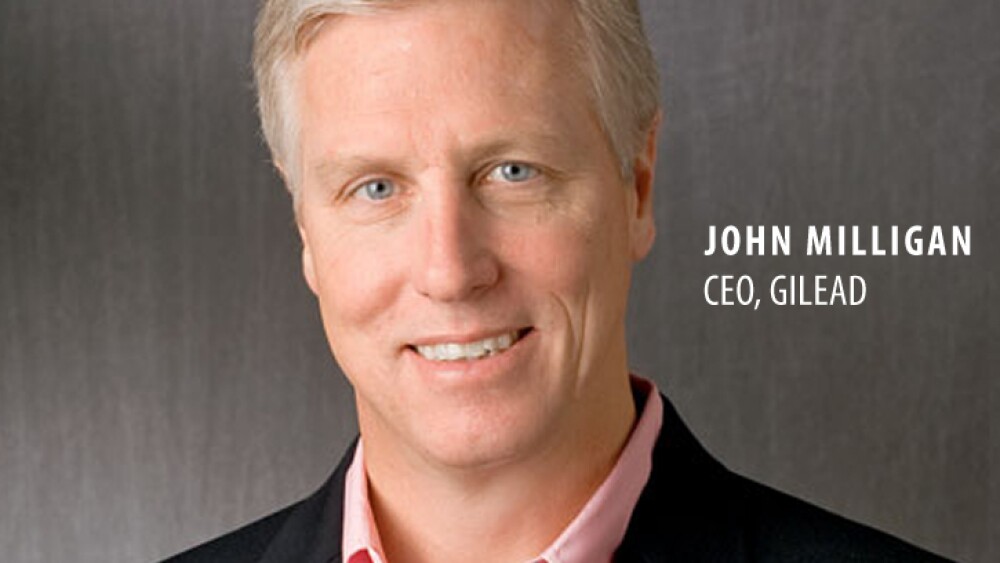October 20, 2016
By Mark Terry, BioSpace.com Breaking News Staff
What’s to be done about Gilead Sciences ? Although the company is still a dominant player in the hepatitis C (HCV) and HIV market, concerns over the future of its HCV franchise has caused the stock—and hence the company’s market value—to drop in the last year. There’s a big push on the part of investors for Gilead to buy somebody, whereas others think Gilead would make a juicy acquisition target. George Budwell, writing for The Motley Fool, takes those into consideration as well, while mulling a third option—a change in leadership.
Gilead’s HCV franchise brought in about $8.3 billion in the first half of this year, and its HIV franchise also brought in about $5.4 billion in the same period. Despite that, the stock is down, having lost more than 35 percent of its value since June 2015.
Sean Williams, writing for The Motley Fool in mid-September, said, “Wall Street’s concern centers on the idea that Gilead is no longer a growth company, with recent data helping to back up Wall Street’s claim. Larger gross-to-net discounts offered to insurers have weighed on Gilead’s HCV sales, with blockbuster Harvoni, the second-best-selling drug in the world in 2015, seeing its sales fall to $5.58 billion through the first-half of 2016 from $7.19 billion during the same timeframe last year.”
And at least part of Gilead’s problems is that, having several mega-blockbuster drugs, for investors, just having good drugs, or even the occasional blockbuster, just won’t be enough. It’s not “go big or go home.” It’s “go biggest or go home.”
Investment bank Evercore ISI surveyed biotech industry observers, asking them which company they thought should be bought in the next year and Incyte (INCY) was the top acquisition target, but Gilead was their choice to buy Incyte . But Williams argued that Pfizer should consider buying Gilead. And maybe Merck would be interested in Gilead.
Budwell notes that Gilead probably has about $35 billion in cash, cash equivalents, and marketable securities. So it has the means to buy something. “But building ample firepower to execute a value-creating acquisition and locating a suitable target at a reasonable price don’t necessarily follow a linear path. The stark reality is that Gilead’s management could have pulled the trigger on a bolt-on acquisition long ago, but instead chose to plow a whopping $9 billion into share buybacks this year.”
One problem, he argues, is that Gilead’s historical strengths don’t quite match up with the companies on the market. “In a nutshell, Gilead excels at developing small molecule antiviral drugs and combination therapies for infectious diseases like hepatitis C and HIV. The biotech hasn’t, however, had much luck in expanding into biologics or branching out in a big way to other markets, like cancer and inflammatory diseases, despite significant efforts to do so.”
And some of this might be related to difficulties in finding the right fit.
Another problem, Budwell writes, is that Gilead’s management isn’t experienced in growth-by-acquisition, which is common in large-cap biopharmas. He writes, “Given the lack of targets that fit seamlessly into Gilead’s core area of expertise in infectious diseases, though, the biotech’s management may have to broaden their horizons to stave off further value destruction in the near term. The market’s patience, after all, has clearly run out.”
In short, Gilead’s strategy has generally been to buy small companies and utilize their own clinical skills in developing new products. But that isn’t working. Budwell brings up Gilead’s acquisition of Nimbus Therapeutics this year for $1.2 billion, which hasn’t had any effect on the company’s stock price. That deal, and its acquisitions of Phenex Pharmaceuticals and EpiTherapeutics ApS, and a licensing deal with Galapagos NV for an anti-inflammatory drug, filgotinib, are long-term strategies, years from having products that can hit the market.
Budwell offers up some potential mid-cap acquisition targets, including Ariad Pharmaceuticals , Exelixis and Tesaro . But he also thinks if the company doesn’t bolster its long-game strategy with some short-game razzle-dazzle, shareholders are going to lean hard on a change of management.
He writes, “Shareholders, after all, haven’t shown much patience for Gilead’s long term view when it comes to value creation and product development of late. Unfortunately, the biotech’s managerial team has been hesitant to break with its core strategy of buying early to mid-stage clinical assets. And that decision has cost its shareholders dearly.”





